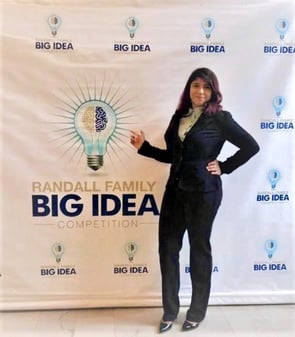 Sneha Jeevan '21 at the Randall Family Big Idea Competition (RFBIC)
Sneha Jeevan '21 at the Randall Family Big Idea Competition (RFBIC)
When I stepped into room 1044 in Benedum Hall, I didn’t know what to expect. I had just entered sophomore year studying bioengineering at the University of Pittsburgh, and I believed that my path, my purpose in life, was to pursue a career in medicine and achieve the dream of becoming a doctor that my family had set on me. Due to a schedule conflict between two classes, I switched out of Genetics and wandered into Startup Fundamentals, a choice that I had thought was a mistake at the time. I didn’t know anything about startups and being part of the world of business wasn’t my goal, so begrudgingly I sat down, opened up my notebook, and began to listen to Babs Carryer as she described the journey into the field of entrepreneurship.
Over time, that “mistake” blossomed into a newfound passion in entrepreneurship and startup development.I had always been interested in medical devices and helping people, and with my major in bioengineering, I assumed that the only way for me to help others was to become a doctor. However, Babs had opened doors to a whole realm of possibilities, and each day I looked forward to attending the class, eagerly taking in every word as Babs explained the intricate details of starting one’s own business. Towards the end of the semester, we were required to team up with classmates and develop our own startup pitch. I had led my team as the “CEO”, pitching a smart pill-enclosure for opioid medication to prevent addiction.
Riding on the high of the positive remarks from my classmates, I decided to pitch the idea at the Randall Family Big Idea Competition the following semester. I recruited my close classmate to join me, and we established a team and set out to win the competition. As the project lead, I coordinated a team of engineers to develop a pill enclosure for critical care patients for better medication adherence. I performed customer discovery and collaborated with physicians, nurses, and GPOs within UPMC Shadyside to create distribution channels for the commercialization of the product.
Although we reached the final round, we didn’t win the competition. This was the first blow I had in my entrepreneurial career, as I had been working on the idea for close to a year and had genuinely believed in the potential the device had. However, I didn’t let my disappointment slow me down! Determined to show the merits of the device, I applied for the Blast Furnace Student Accelerator program, a 2-month summer incubator that would allow us to further develop the business. Our idea was selected, and my classmate and I worked tirelessly to bring the product to market.
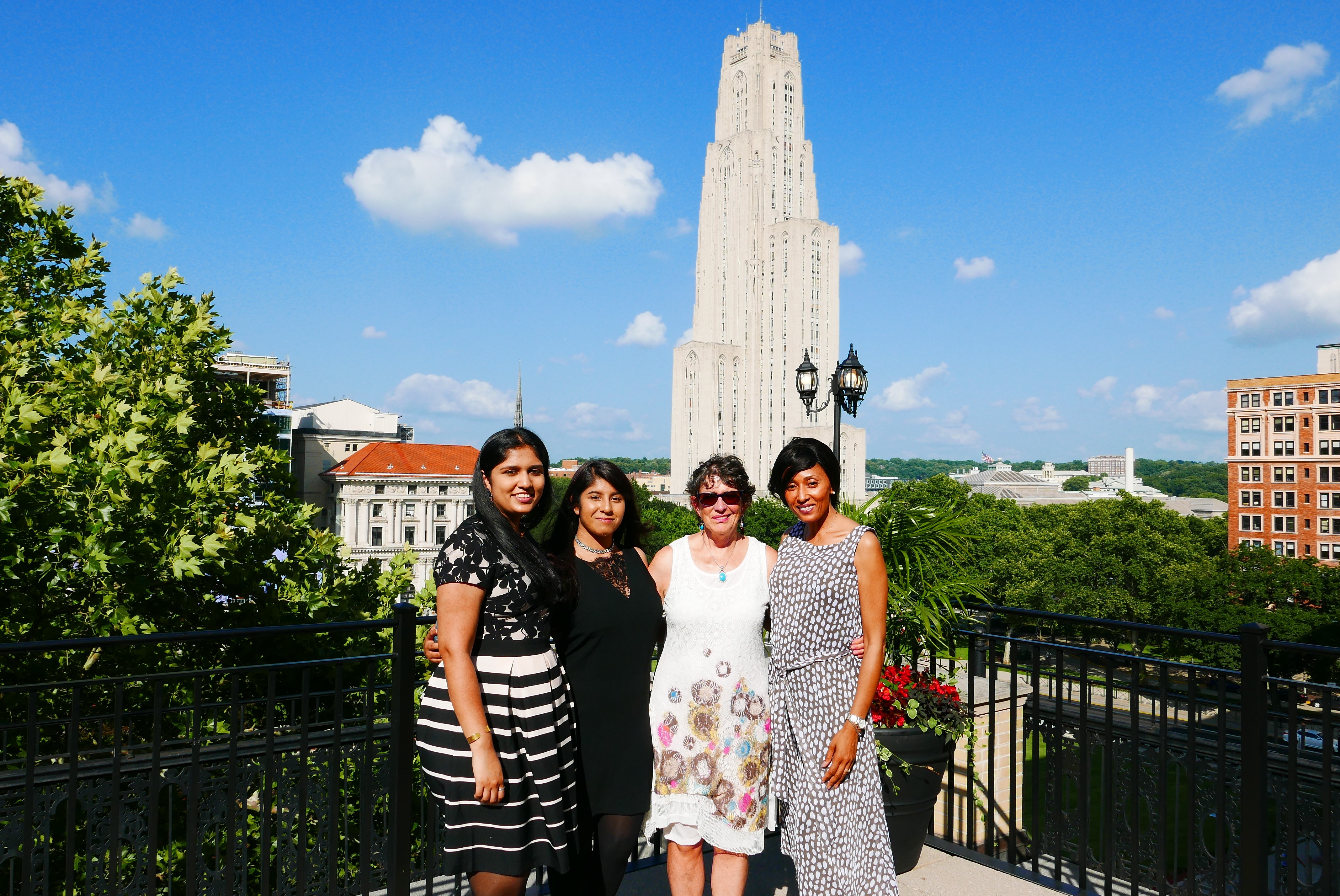 Pictured from left to right: Shivani Tuli '21, Sneha Jeevan '21, Big Idea Center Director Babs Carryer, Entrepreneur in Residence Jeanine McCreary
Pictured from left to right: Shivani Tuli '21, Sneha Jeevan '21, Big Idea Center Director Babs Carryer, Entrepreneur in Residence Jeanine McCreary
Through the tutelage of our entrepreneurs in residence (EIRs) Jeanine McCreary, Don Morrison, Phil Marzolf, and Babs Carryer, we were able to expand upon our idea and finally present it in front of several Pittsburgh-based investors. Our presentation caught the eye of Rich Lunak and the Idea Foundry, and we spent several weeks working with them to further improve our product. Throughout our time in Blast Furnace, I began to realize that our idea was too early-stage and we had limited resources that would allow us to penetrate the market in a timely manner. By the end of summer, I made the decision to disband the team and relinquish the idea. This taught me a lesson in feasibility and how important it is to objectively evaluate your product in order for it to succeed.
A year had passed, and I was looking for the next idea to delve into. My previous teammate had reached out to me after her summer vacation in India with the idea for a blood-testing device for rural villages in India. Her first-hand exposure to lack of medical care in her own town and the striking gap in accessible healthcare in low-resource communities clicked, and I was invigorated by the far-spread potential this device had. I quickly joined hands with her, and with a new team, we applied for the Randall Family Big Idea Competition. I had pitched our team’s idea in the first round and we breezed through to the second round. From our first round, we solidified our idea and called it Blodot: the new complete blood count point-of-care device for rural villages in India and Africa.
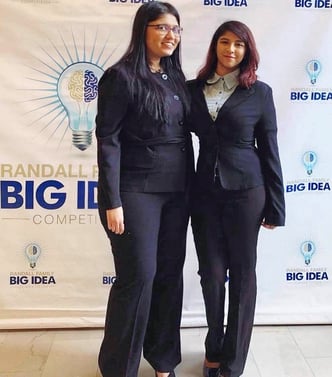 Team Blodot at RFBIC: Shivani Tuli '21 (left) and Sneha Jeevan '21 (right)
Team Blodot at RFBIC: Shivani Tuli '21 (left) and Sneha Jeevan '21 (right)
As the project lead and acting CFO, I managed supply chain forecasting and product distribution by establishing potential commercialization channels in Indian government hospitals and sourcing microfluidic components to meet our development standards. Working with our mentor Don Taylor, I was able to discern a market gap of $150 million within India alone, and through these discussions, I was able to develop a business and revenue model for our dream company. I also helped facilitate the prototyping of the product, creating a prototype of the wafer design for a microfluidic chip for blood cell separation in the device.
After weeks of rigorous practice and extensive meetings with our mentor, we anxiously pitched our idea in the final round of the competition. Later that day, we sat in the Charity Randall Theater, holding hands and patiently waiting for our team name to be read. As the winners were being announced, my partner and I sighed in despair, and we began to pack up our things.
And then we heard it. “Our second-place winner: Blodot!” My partner and I jumped out of our chairs screaming with joy, enticing a chuckle from the audience in the theater. We ran up the stage like children, overwhelmed with joy at our $15,000 prize!
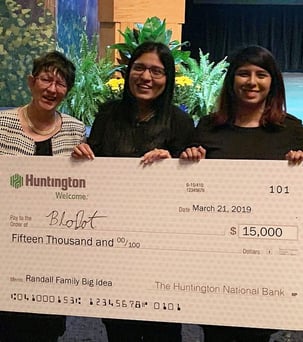 Babs Carryer awarding team BloDot with their 2nd place prize of $15,000 at the RFBIC!
Babs Carryer awarding team BloDot with their 2nd place prize of $15,000 at the RFBIC!
Afterwards, we were offered the opportunity to participate in the Blast Furnace program again that summer, but I had already committed to SERIUS, a summer research program with the National University of Singapore. It had been a long-awaited dream of mine to go to Singapore, and I was getting to do research with the forefront of neurotechnology, Dr. Nitish Thakor. But I also did not want to give up on the hard work that my team and I put into this project, and so I decided to enroll in the Blast Furnace program while working remotely in Singapore. In the morning, I worked in the lab and explored the country of Singapore. In the night, I attended workshops and developed presentations on new market research. I was passionate about both projects, and I gave it my all, working to develop both a novel neural electrode for selective neuromodulation for the SINAPSE Laboratory and regulatory strategies to advance Blodot by reviewing pre-FDA approval paperwork for protocols in both American and international markets.
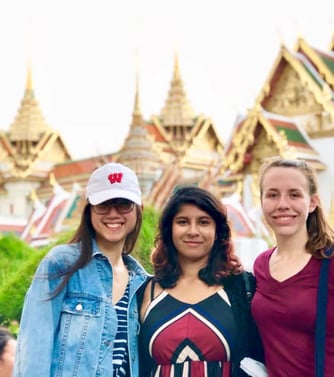
Thanks to the mentorship of Jeanine McCreary and Babs Carryer, we were able to finish the program with a clear vision for our future. Our vision, unfortunately, was crushed as we realized that a major corporation had already commercialized a similar idea and were in the final steps in launching the product. Looking at the financials, I knew we needed a large investment to even start the first phase of our trials. With a heavy heart, I advised our team that we end our project. This taught me a lesson about identifying the competition and discerning the scope of your idea.
Thankfully, my entrepreneurial journey did not end there. My research work in Singapore led me to a Research and Development Co-op position at Interphase Materials, a specialized engineering company that provides innovative surface treatment technologies to improve the efficiency of industrial cooling systems. There, I was able to not only formulate innovative chemical treatments for the Department of Defense and the Navy, but I was also applied my business development skills to expand the company’s platform.
Due to the Covid-19 pandemic, my co-op was cut and I quickly entered a new position as a Translational Lead at the Soft Tissue Mechanics Laboratory. I’m currently working with Dr. Vande Geest to help commercialize his research of an endovascular device for the treatment of peripheral arterial disease behind the knee. I also hesitantly applied for the Pitt Ventures First Gear program, an NSF I-Corps program that helped early-stage University research to viable products that could be taken to market. With luck, I got in, and I attended weekly Zoom Workshops to learn more about marketing and startup development. With the mentorship of Richard Heilman, Paul Petrovich, and Phil Brooks, I presented weekly as the team’s Entrepreneurial Lead on our progress throughout the program. I led our customer discovery by interviewing vascular surgeons and interventional cardiologists across the nation to gain insight on the need for a device. The newfound connections I have made through this project have opened new doors for me in the world of entrepreneurship, most recently leading me to act as a business development consultant for other startups in the Pittsburgh area.
Three years ago, as I was sitting in room 1044, I had no idea that the class I considered to be a “mistake” would lead to a career in business development and entrepreneurship. I’ve learned many lessons along the way, and have faced tribulations in every project I have endeavored, but each experience has been a stepping stone to shaping my career in business. I am very thankful to Babs Carryer for helping me kickstart my journey and all my mentors for opening my eyes to a brand new world of innovation, creativity, and passion for change. I know I’ve only seen the top of the iceberg of this new world and I look forward to diving deep and seeing just how far I can go!